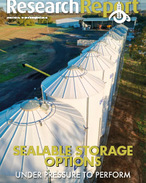This article is 3 years old. Images might not display.
Dr Whitehouse is one of a few international experts working in applied seed longevity research and her principal goal is the effective utilisation of germplasm - the living tissue from which new plants are grown - for hundreds of years.
"I am really passionate about global food security and my research focusses on improving and optimising seed longevity and quality management systems to ensure germplasm availability for hundreds of years," Dr Whitehouse said.
Dr Whitehouse completed a PhD investigating the optimal conditions for drying rice seeds to maximise their life span in long-term genebank storage, which kicked off a five-year stint based at the world's largest rice genebank in the Philippines.
A career highlight involved travelling to genebanks located in centres of crop diversity including Mexico, Colombia, Ethiopia, Nigeria, Morocco, Lebanon and India, as part of a post-doctoral position working on the Seed Longevity Initiative.
Dr Whitehouse joined Agriculture Victoria in 2018 at the AGG in Horsham.
"I have spent a lot of time streamlining and optimising the efficiencies of our genebank processes including seed production, harvest, drying and storage.
"My recent research has focussed on lentil, as it is one of our mandate crops but one which at present we know very little about its longevity," she said.
Since 2018 Dr Whitehouse has set up two experiments. One experiment determines the lentil's inherent longevity. This will allow scientists to quantify lentil seed longevity under genebank storage conditions and help to better manage the lentil collection.
The second experiment is identifying how to optimise longevity by maximising seed quality at harvest. Results will be used to optimise regeneration protocol at the AGG to ensure high quality seeds are produced every time.
"I enjoy applied research as I know it will evoke change and lead to improvements. My area of work helps to ensure the availability of genetic resources into the future and to improve crops to tackle climate change and food security - two things I am very passionate about," she said.
This week is National Science Week and Kondinin Group is proud to publish related content.
For more details, visit www.scienceweek.net.au























